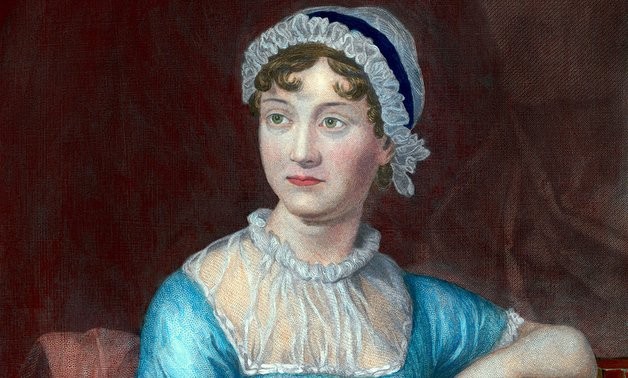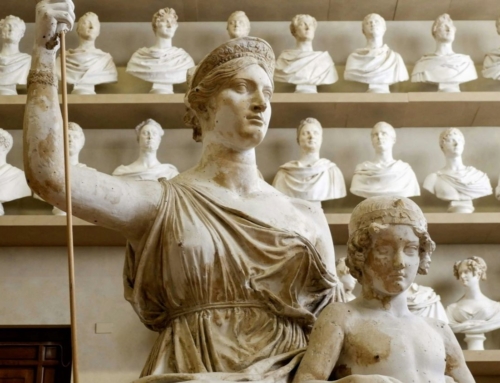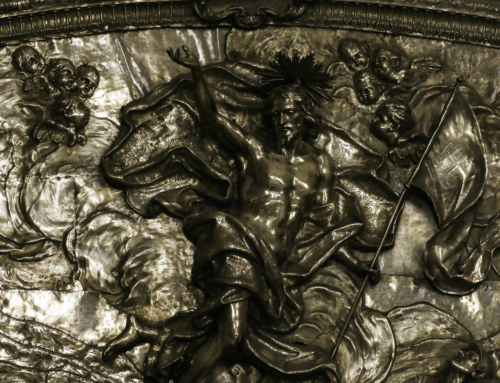The first in a series considering Jane Austen in light of Aristotle and Thomas Aquinas.
Give us grace to endeavor after a truly Christian spirit to seek to attain that temper of forbearance and patience of which our blessed savior has set us the highest example; and which, while it prepares us for the spiritual happiness of the life to come, will secure to us the best enjoyment of what this world can give.
—from Jane Austen’s Prayers
Describing them as “the last great representative of the classical tradition of virtues,” Alasdair MacIntyre identifies in the works of Jane Austen a marriage of Christian and classical themes. Many elements of a systematic virtue ethic shine through the entire body of Austen’s work, as the search for happiness undergirds the actions of each character that appears in the novels. Whether it entails discussing Shakespeare’s sonnets with a charming young man or accepting the proposals of a very silly clergyman, each action is directed to what the character perceives to be the good, ultimately for the sake of attaining “the best enjoyment of what this world can give,” or happiness of the pre-heaven variety. That being said, Jane Austen does not merely relate amusing vignettes describing various ways in which people go about seeking their own happiness. In the resolution of each of her novels, it is clear that only some characters achieve stable and respectable forms of happiness, while others still seek it or fail to achieve it. So, clearly some characters act in a more efficacious fashion than their counterparts, and at the heart of every instance of greater success, one finds virtue.
In his theory of the virtues, Aristotle regards happiness as the goal of all human action, including the most mundane tasks, such as eating and sleeping. Following in the tradition of Aristotle, St. Thomas Aquinas asserts that even evil actions which reject the good and, therefore, true happiness are actually done for the sake of what the person (mistakenly) perceives to be a source of happiness. Ultimately, both Aristotle and St. Thomas contend that only those who seek the true good achieve happiness, whereas those who reject it in favor of an inferior good remain ever discontent. In order to regularly distinguish and subsequently choose good actions from less good ones, individuals need certain habits. Otherwise, the attainment of happiness would be nothing but a matter of chance, as Charlotte Lucas argues is the case in marital felicity. Habits that dispose us to choose the good are called the virtues.
It is exactly in this way that the protagonists of Austen’s novels distinguish themselves from the rest of her characters. Her heroines do not simply ask themselves the question, how do I want to live my life, for presumably even Lydia Bennet has asked herself this question and replied, to eat, drink, and be merry! Rather, the heroines and heroes of Austen’s novels ask themselves, how do I lead a good and happy life? The reader finds evidence of this dynamic throughout the novels, as the omniscient narrator often gives glimpses into their introspective thoughts, as the characters examine their actions and question whether their deeds were truly conducive to their happiness.
Even more to the point of illustrating examinations of conscience are the episodes in which the heroines experience moments of conversion, seeking to measure the true worth of their previous deeds. Such is the case of Elizabeth Bennet when, upon careful consideration of Darcy’s letter concerning his relation to Wickham, she painfully acknowledges the rashness of her actions regarding these two men exclaiming, “till this moment, I never knew myself.” Similar experiences can be found in the accounts of Marianne Dashwood, Emma Woodhouse, and Catherine Morland in which the heroines find their actions sorely wanting in goodness and subsequently seek to reform their lives by choosing better actions, or acting more virtuously.
Another critical aspect of Aristotelian virtue ethics is the importance given to the individual, moral person in her totality. It is not a question of mind over body, but rather of an integral whole, mind and body, making decisions in the face of challenges that come up in life. This dynamic is the primary focus of Sense and Sensibility, as the title declares forthrightly. A rather poor reading of this novel would suggest that Austen favors a rational approach to romance to one based upon feeling or that Elinor, as well as Marianne, must learn something from her counterpart. However, when the narrator introduces Elinor to the reader, she is described as having “an excellent heart” and that “her feelings were strong; but she knew how to govern them.” Mind is not given a monopoly in virtuous action, and Elinor is by no means a stranger to emotion. It is through the union of the intellectual and the sensible that Elinor is able to weather her troubled course throughout the novel much more composedly than her overly affectionate sister, Marianne.
Austen also stresses the importance of the individual in making her own decisions concerning her happiness and how best to achieve it. Voluntariness is a necessary component of moral action, and the presence of an overriding external influence limits the act’s identifiability with the morally good or bad. This individual accountability is well displayed in Mansfield Park when Fanny perseveres in resisting the unjust persuasions of her uncle, Sir Thomas, to accept the morally suspect Mr. Crawford. Sir Thomas believes it her duty to set aside her own sense of moral uprightness in favor of his own. However, Fanny properly maintains her conviction that she is the best judge of the situation, as it concerns her own happiness and as she has had more opportunities for observing and judging the behavior of Mr. Crawford. In line with the thought of Aristotle and Aquinas, Austen empowers her heroines to assert their individual prerogative in their own decisions.
Throughout all of Austen’s novels, the reader does not only find illustrations of the presence and absence of virtue, but also depictions of its acquisition and accompaniments, such as friendship. As I proceed in this series of posts, my discussions will follow the general progression of this life of virtue, from its foundation in moral principles through its growth by the development of wisdom and finally to the attainment of the final end of happiness. Also, since friendship plays a central role in Austen’s novels and in the virtue theories of Aristotle and his followers, I will consider it, as well, as a critical component to the life of virtue. In the end, I hope to instill the conviction that there is something more than romance and drama in the novels of Jane Austen, namely a systematic approach to leading the good and happy life.
✠
Image: James Andrews, Portrait of Jane Austen







